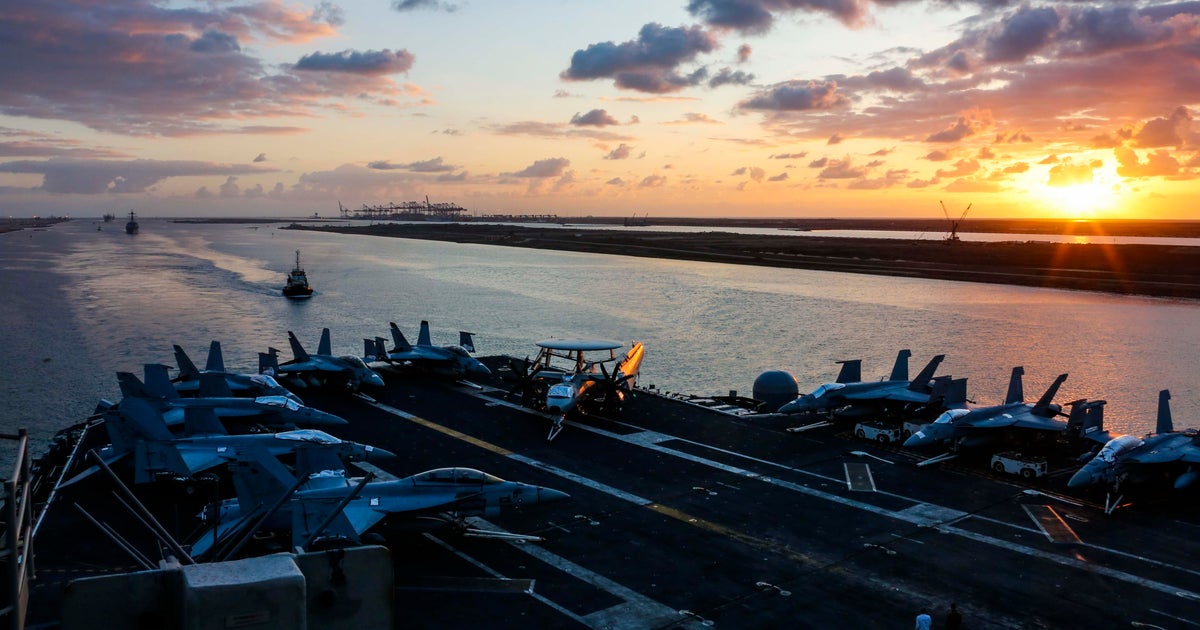
Tensions with Iran remained high on Wednesday as mystery swirled around the whereabouts and status of an oil tanker in the Persian Gulf. CBS News senior national security correspondent David Martin says U.S. officials believe Iran has seized the small coastal tanker along with its crew of 25 people.
Iran has said it responded to a distress call from the Panamanian-flagged tanker MT Riah, based in the United Arab Emirates, and came to its rescue. But no other nation has reported receiving a distress call from the Riah, which was seen being escorted by Iranian naval vessels after the transponder that automatically reports its location was switched off on Saturday. At last report, the ship was anchored off Iran's Qeshm island, which hosts a number of bases belonging to the Islamic Republic's elite Revolutionary Guard force.
Martin is the only U.S. network correspondent travelling with the top U.S. military commander for the Middle East as he tours the region.
On Wednesday, Gen. Frank McKenzie visited the Maritime Security Center in the country of Oman, just outside the Persian Gulf. The center, run jointly by the U.S. and Oman, opened just last year. From the facility, the U.S. and its partners keep track of the more than 100 ships that traverse the Persian Gulf every day.
"I think this is a great example of partners in the region that are doing what they can to provide for freedom of navigation in the area," McKenzie told CBS News. "I think this is an excellent example of Oman doing the best they can with the capabilities they've got. We help them, they help us. It's an international effort and I think it's a great statement of what we need to be doing here in the region."
McKenzie is trying to set up an international flotilla of ships that would keep the vital maritime traffic in the Gulf safe from Iranian interference.
"It's really an international problem," the U.S. Marine Corps general told Martin. "It's not a United States problem -- although certainly the nations that immediately abut the Strait of Hormuz have a special responsibility to ensure freedom of navigation, of commerce that flows through for the world."
The Strait of Hormuz is a narrow passage that serves as the gateway to the Persian Gulf. A third of the world's shipped oil supply passes through the strait every year, and any threat to that traffic can have a rapid and significant impact on global oil prices.
In the past two weeks, Iran has attempted to seize a British tanker, and apparently hijacked the smaller Riah -- although the Iranians claim they were merely helping a vessel in distress.
The U.S. has overwhelming firepower in the area, including the aircraft carrier USS Abraham Lincoln, which is operating just outside the Persian Gulf. But the U.S. does not want to get into the business of escorting ships into and out of the Gulf.
President Trump has approved an operation in which U.S. warships would act as sentinels at the entrance to the Gulf -- as long as other countries that are more dependent on Middle East oi, agree to pick up 80 to 90 percent of the cost.
https://www.cbsnews.com/news/iran-news-us-iranians-seized-oil-tanker-riah-persian-gulf-frank-mckenzie-oman-naval-flotilla-today-2019-07-17/
2019-07-17 10:35:00Z
52780333224489



![Rohingya refugees cross the Naf River on an improvised raft to reach Bangladesh in November 2017. An investigation has found the Myanmar military continued to attack the Rohingya even as they tried to escape. [Mohammad Ponir Hossain/Reuters] Rohingya Bangladesh](https://www.aljazeera.com/mritems/Images/2018/12/4/8eebeadca2d74100ae5f78de06dcbbe0_18.jpg)
